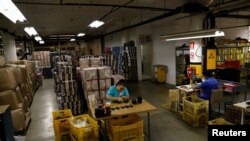Michele Tini has kept her shoe factory in southern Caracas afloat for more than five decades, despite years of economic instability, hyperinflation and competition from contraband products that have long battered industrialists in Venezuela.
Now Tini, who emigrated from Italy in the 1960s when he was 14 and immediately began working in shoes with his father, faces a new challenge: an expanded trade with Colombia.
The two countries normalized trade relations in September by fully reopening their 1,400-mile border, fulfilling a key campaign promise of Colombia’s new president, Gustavo Petro.
The change opens Venezuela to more imports from its neighboring country, while manufacturing is still facing imbalances in the economy, despite the push for de facto dollarization.
Tini’s company, Full Time, one of Venezuela’s largest shoemakers, increased production to 20,000 pairs this year from 12,000 in 2021, but he is concerned about imports.
“With Colombia we continue in this fight,” Tini told Reuters when referring to the entry of Colombian merchandise under the deafening noise of his factory and where the workers produced shoes for women, men and children. “It’s a new competition.”
For years, the manufacturing activity in Venezuela faced a model of exchange and price controls that limited production, in addition to hyperinflation and lack of financing.
Although more than three years ago the government relaxed regulations allowing more foreign exchange transactions, the oxygen of dollarization has not been enough to recover all industrial activity, according to analysts.
Year-on-year inflation in Venezuela is 114.1%, according to official data, and is one of the highest rates in Latin America.
High prices affect production costs as well as other factors such as low demand, increased local taxes and tax exemptions for imported products, including some Colombian items.
Local industries “cannot compete on equal terms with Colombian products,” Luigi Pisella, president of Conindustria, one of the main unions that groups the country’s companies, told Reuters. “Our first problem is still the inflation that we have to bring down.”
Between January and August of this year, exports from Colombia to Venezuela were 400 million dollars, according to the National Administrative Department of Statistics (DANE) of Colombia. Imports from Venezuela were 56 million dollars.
Among the products that Venezuela has sold to Colombia this year are glass, scrap metal, cotton, plastic, fats, bricks, fish and liquor, according to Import Genius, a company that tracks customs data.
The Central Bank of Venezuela and the National Institute of Statistics have not disclosed trade figures.
“We cannot compare ourselves with Colombia with the advantage that they have,” said Tony Di Benedetto, vice president of the Venezuelan Chamber of Footwear, who added that for every 10 products that enter from Colombia, Venezuela exports one. “We can’t be competitive,” he added.
The Colombian government estimates that the flow of trade would go from 600 million dollars, as projected for the end of 2022, to about 1,000 or 1,200 million dollars. The figure is far from the 7,000 million dollars that the bilateral exchange reached in 2007 and 2008.
The Venezuelan Ministry of Communications and Information did not immediately respond to requests for comment.
In addition to reopening the border, Petro and Maduro held a first bilateral meeting on Tuesday that they described as “fruitful” and in which they discussed trade, the environment and human rights.
The industrialists consulted said that there are few incentives to be able to increase production and face competition with foreign products.
“There is no support at this time for public policies that allow the recovery of the competitiveness of the national industry, essential to be able to export, to be able to go to Colombia and to be able to go anywhere in the world,” said Omar Bautista, president of the Chamber of Venezuelan Manufacturers of Automotive Products (Favenpa).
Connect with the Voice of America! Subscribe to our channel Youtube and turn on notifications, or follow us on social media: Facebook, Twitter and Instagram.















